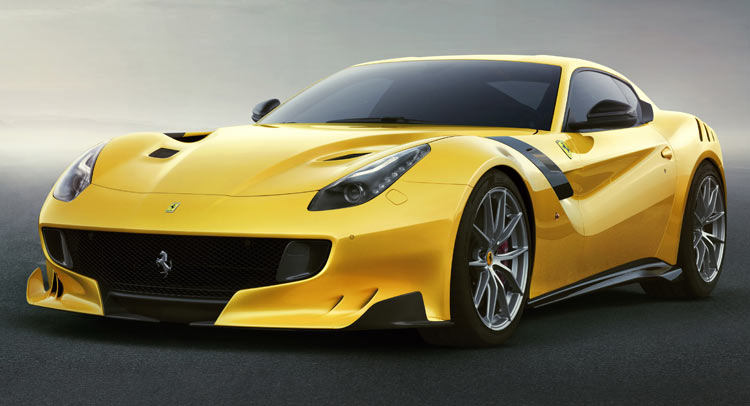This is Ferrari’s F12tdf, the ultimate expression of the F12 Berlinetta which will be built in a limited run of 799 units.
As the name suggests, the F12tdf pays homage to the Tour de France, the legendary endurance road race that Ferrari dominated in the 1950s and 1960s, particularly with the 1956 250 GT Berlinetta which won four consecutive editions.
Ferrari has focused on three key areas while developing the F12tdf: engine, aerodynamics and vehicle dynamics. As a result, the new car is the superlative of the F12 Berlinetta series in terms of acceleration, road holding and agility.
The model is powered by a 6.3-liter naturally-aspirated V12 engine derived from the F12 Berlinetta which delivers 780PS (770hp), 40hp more than in the regular model. Ferrari has also increased by 8 percent the ratio of the front tyres compared to the rear ones for an even more dynamic behavior and has fitted the car with an innovative rear-wheel steering system called Virtual Short Wheelbase.
Integrated with the other vehicle dynamic control systems, this system guarantees the steering wheel response times and turn-in of a competition car while increasing stability at high speed, according to Ferrari. Furthermore, the F12tdf can reach higher cornering thanks to an 87-percent increase in downforce.
The car has also undergone a serious diet, losing 110 kg (242.5 lbs) due to the abundant use of carbon-fiber inside and out and a radical redesign of the bodywork, interior, engine, transmission and running gear.
As a result, the F12tdf is able to sprint from 0 to 100 km/h (62 mph) in 2.9 seconds and from 0 to 200 km/h (124 mph) in just 7.9 seconds! Ferrari says it also laps Fiorano in just 1 min 21 sec.
Stopping power is ensured by new Extreme Design one-piece brake calipers already seen on the LaFerrari. This new-generation system can stop the car from 100-0 km/h in just 30.5 meters (100 feet) and from 200-0 in 121 meters (397 feet).
The 6.3-liter V12 engine produces 780PS (770hp) at 8,500 rpm, which translates into a specific power output of 125PS/liter. Maximum torque is 705Nm (520lb-ft) at 6,750 rpm (up from 690Nm), with 80 percent already available at 2,500 rpm. Engine modifications include race-inspired mechanical tappets and variable-geometry intake trumpets used on Formula 1 cars.
The engine is mated to a specific version of the F1 DCT with 6 percent shorter gear ratios that delivers 30 percent faster upshifts and 40 percent faster downshifts.
In terms of aerodynamics, the F12tdf has an aerodynamic efficiency figure of 1.6, almost double that of the F12 Berlinetta. Downforce is 230 kg at 200 km/h, an increase of 107 kg.
One can say the car has been styled by aerodynamics: all of the bodywork panels, from the nose to the tail, have been revised. In addition, wider front and rear tracks give the car an even more aggressive appearance. Inside, the Ferrari F12tdf features a driver-focused cockpit with carbon-fiber housings for the instruments and satellite pods, single carbon-fiber shell doors, Alcantara trim, technical fabric for the seats and patterned aluminum for the floor.










